
What is America to U.S.?— is intended as a critique of current and past instances of our country going backwards from morals and its founding values (liberty, equality, etc.). In isolated scenes of gingerbread-esque people experiencing different real-world issues such as healthcare inequality, racism, negative politicization of civil rights (opposing the right to gay marriage, banning DEI, banning LGBTQ+ protections, etc.), economic inequality, and more. They were painted in that style for time conservation (as part of a college class project) while also to not cover up the newspaper clippings that pointed these topics out. I will apologize ahead of time if this offends anyone in any way, given our current political climate. I had no intention of doing that to anyone and only made this artwork to point out the issues present in our society.
Thomai Dunn was born in 2006 in Bakersfield, California. In 2026, she’ll graduate with a Studio Arts AAT along with three other degrees and one certificate. She was included in the student art galleries of Emerson Middle School and Bakersfield College. She was a member of the Bakersfield High School chapters of the National Honor Society and the California Scholarship Federation, Class of 2024. Her main goal is to graduate and pursue a career with a BA in animation from CSU Fresno, but she is also open to anything else that’ll pique her interest, whether it pertains to art or not.





